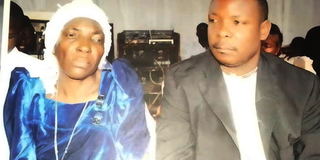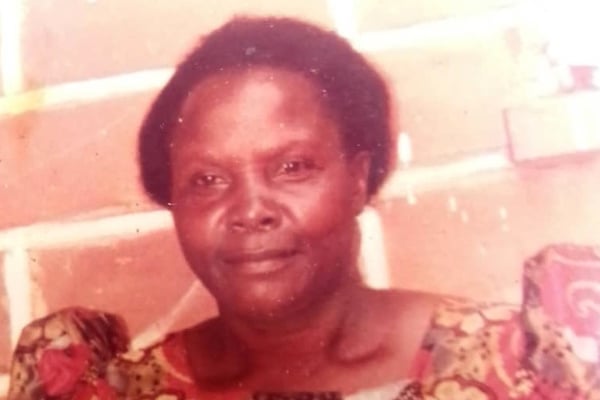Prime
‘I will never know what killed my elder brother’

Baker Kabonge Misinde (R) and his mother Tatu Nanyanzi (L). Photo /Courtesy
What you need to know:
- Kabonge Misinde allegedly suffered stomach ache after eating food on Masaka Road.
The day I started my journalism career, my elder brother—Baker Kabonge Misinde—was very excited about the person I had become. He often asked me to send him greetings whenever I appeared on television or radio.
While fighting for his life in hospital, he said to me that he was recognised as “a brother of Monitor journalist Gabriel Buule.” The pride he beamed from his hospital bed was palpable. I chose a noble profession, he told me.
“Use it to support others,” he said, adding, “but when you appear on Spark TV, send me greetings.”
Sadly, an obituary is not the media experience he had in mind. My brother had been wheeled into Rubaga Hospital on January 17 after presenting with stomach complications. He complained about stomach ache after a meal at a local restaurant en route to Masaka.
It has taken me days to compose myself and eulogise Mwaana waffe, as we fondly called him. Born in 1973, Misinde is survived by six children (Ismael Kabonge, Abbas Ssenfuma, Moses Ddamba, Ramathan Buule, Ali Bwete and Sumaiyah Nakaye) and one grandchild (Imran Kaye). He was preceded in death by his father and mother who died in 2021 and 2022, respectively.
Last moments
A week before he died, we had a family meeting at our family home in Bwanda Village, Mpigi Town Council. Misinde had called me in the middle of the night to inquire whether we would go together for a meeting. The unusual part about the phone conversation was that he spent most of his time expressing his dissatisfaction about family meetings and going home.
One of his sons tagged along during our journey to Mpigi. Misinde told me that he wanted his children to know their roots before he dies. He kept on talking about death during our journey to our home district. As we parted ways, he asked to visit me at my home on a Sunday.
“Life is short,” he said, adding, “we have to spend moments together as siblings. I will be coming to your place and we will share a meal.”
Before that day even blipped on the radar, I received a phone call from Misinde’s number. I thought he was either calling to bring me up to speed about family issues. A frail voice of his wife, however, said to me on the other end of the phone: “He is sick and I am failing to understand what exactly he is suffering from. We are at Joy Medical Centre in Ndeeba. Inform others.”
Bedridden
I had never seen my brother fall sick. He would suffer an odd cough or cold, but nothing to leave him bedridden. I, therefore, expected him to make a swift recovery. When another call from a sibling told me Misinde had been referred to Rubaga Hospital, I knew something had gone awry.
I visited him in hospital and he seemed alright. He would respond to my questions by nodding in approval or disapproval. Jalia, our sister, said to me that Misinde felt pain because of the tube that was placed in his nose. That was the reason as to why he was nonverbal.
Indeed, when the tube was removed, he spoke to me about family, his children and his desire to be financially independent.
“I will stay. I will not die. I know you can support my family in my absentia, but it seems a heavy task,” he said to me.
His worry was that he had taken days without passing out stool. He also felt pain in the pits of his stomach.
“I had a meal on my way to Masaka, but until now my life has changed. Doctors say that it is so important if I ease myself and that is what I am also waiting for,” he revealed.
When my elder sister, Annet, told me the next morning that “Baker is not well”, I rushed to the hospital. On arrival, I found him smiling and talking to everyone. We had a private discussion and he asked me if it was possible to refer him to Mulago Hospital. I responded affirmatively albeit with a caveat that we seek the family’s involvement.
“Let it pass,” he replied, “they are already struggling to contribute to my hospital bill. They might feel offended. Let us wait until tomorrow and if my situation worsens, do it yourself.”
Misinde wanted to know from the attending physician whether he had been cleared to drink some water. He received an affirmative answer. He would later ask me to go and hustle so that I can send some money to his children back home.
If tomorrow never comes...
I left Rubaga Hospital in the morning of January 17. I had every reason to believe I would touch base with my elder brother the next day. When I reached my workstation, I buried my head in my phone. I was determined to look for money to contribute to the hospital bill. I wasn’t getting any breakthroughs, though.
I suddenly fell asleep. Besides being weak, I was also grappling with a stomach disorder. When I got up, a colleague lured me outside the office. It’s there that she dropped the bombshell. My brother was no more.
Those who were with him at the hospital told me that he was taken to the intensive care unit. He, however, asked not to be put on oxygen. He climbed into a wheel-chair and proceeded to share light moments with my siblings who had come to visit him.
Moments later, he was pronounced dead. The time of death was around 2pm. His body was taken to the morgue. No post-mortem was carried out to give us closure.
A hard worker
My brother was a human with a distinct approach. He would always wear a smile on his face and provide solutions in times of crisis. Not at any point did he shout at anyone.
Prior to his death, he preached love, unity and peace among most family members he could speak to. He would always give a meal, soda or water to anyone who visited him at his workplace. He was sure to remind them that it is important to share the little you have with others.
From dust you came
At our ancestral home in Busomba-Kyaali Parish in Mpigi District, sheikhs, priests, nuns, family and friends gathered not just to grieve but to thank God for the life of a distinct human being who loved helping and elevating others.
He was laid to rest at Bukunyi Village in Busomba Zone on January 18. The son of Michael Angelo Bwete and Tatu Nanyanzi (both deceased), Misinde studied at Nakivubo Blue Primary School.
He, however, dropped out and he started charting a life as a businessman. He started out by importing polythene bags from Kenya. Later, he opened a garment shop in Kampala, with South Sudan a great export market. At the time of his death, he was in the transport business.




